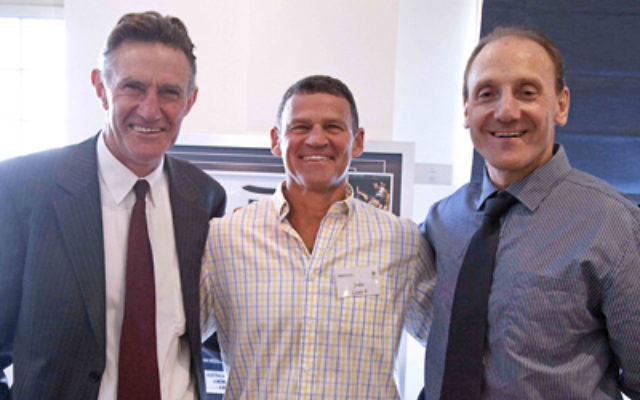An insight into AFL greats
TWO of the greatest AFL players of all time addressed a packed crowd at the Friends of Maccabi luncheon earlier this week, with former Geelong icon Gary Ablett and games record-holder Michael Tuck giving insight into their lives post-football.
TWO of the greatest AFL players of all time addressed a packed crowd at the Friends of Maccabi luncheon earlier this week, with former Geelong icon Gary Ablett and games record-holder Michael Tuck giving insight into their lives post-football.
Ablett reflected on his glittering career and provided his thoughts on the current state of the game, but also focused on his strong religious beliefs, touching on a trip to Israel in the mid-1990s.
“I was fortunate enough to visit Israel for nine days, which was quite an experience,” Ablett told more than 180 gripped listeners at Blake Street Hebrew Congregation.
“It was a tour that followed the biblical track of events, and Jerusalem was obviously the highlight, seeing the Old City of David.
“[But] there were many other great sights, and Israel; though it’s geographically not a very important place, it’s the centre of attention worldwide.”
After a lengthy chat about his thoughts on Israel, Ablett, who is regarded as one of the best forwards the game has ever seen, delved into the intricacies of the way AFL is played today compared to how it was during his playing days of the 1980s and ’90s.
Both he and Tuck, who stands alone as a champion of the game, criticised the league’s stance on the hottest topic at the present time – the bump – and agreed that the style of football has changed dramatically, even joking, “If I played today, I probably would have won three Brownlow [Medals]”.
Tuck also touched on his experience with former Jewish footballer and AJAX legend Michael Zemski, who kicked one goal in an eight-game stint with Hawthorn in the 1970s.
Ablett and Tuck were at the function as advocates for The Smouldering Stump foundation, which assists victims of the Victorian bushfires suffering from post-traumatic stress.
ASHLEY SHENKER
Photo: Simon Nowicki


comments